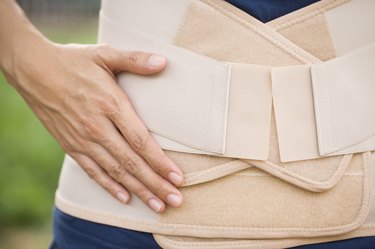
Exercise belts or back braces are used by some exercisers and people who do a lot of heavy lifting at work. The theory behind exercise belts is that they provide support for the lower back to prevent injuries -- but their effectiveness for this is questionable. Hernias are a fairly common injury that can result from heavy lifting, and it may seem logical that a weightlifting belt would help prevent them. However, you should understand exercise belt use and hernia causes before you strap on a belt for your next workout.
Exercise Belts
Video of the Day
You've probably seen people walking around the gym wearing weightlifting belts on occasion -- but for most healthy people, belting up during regular workouts is unnecessary. According to Stephen Bergeron, a certified strength and conditioning specialist, many folks believe that exercise belts can prevent injuries, protect the back, improve form and lead to greater strength increases, but they can actually cause lifting injuries because they give you a false sense of security. Your core muscles should provide plenty of support for your spine, unless you're performing powerlifting movements at 90 percent of your one-rep max or heavier. In these cases, a belt can help to stabilize the torso and keep the lumbar spine from buckling, but it is still not a safeguard against injury.
Video of the Day
Causes of Hernias
Hernias are caused by an organ pushing through muscle or tissue openings that are supposed to hold it in place. Typically caused by muscle weakness and straining, hernias can result from pregnancy, constipation, heavy weightlifting, persistent coughing or weight gain. Although hernias can develop throughout the upper thigh, groin and belly button regions, inguinal hernias, which occur in the lower abdomen, are most common. These herniations happen when part of the intestine pushes through a section of the abdominal wall. An exercise belt is designed to brace the lower back, not to provide support for the abdominal wall, so an exercise belt is not effective for preventing hernias. Straining from lifting heavy weights can result in hernias, so all types of heavy lifting, including those that you'd use a weightlifting belt for, should be avoided if you already have a hernia.
Risks of Belt Use
Although back braces won't prevent hernias, people will sometimes use exercise belts or back braces in an effort to prevent lower-back injuries -- but these efforts are often futile. A study published in the "Journal of the American Medical Association" in 2000 examined a cohort of material-handling employees in 160 retail stores and throughout 30 states to see if the braces reduced reported low-back pain. Researchers concluded that neither frequent use nor employer policies, which required the use of back braces, were associated with a reduction in back injuries or pain among participants.
Hernia Prevention
Hernias can turn into problems that require surgery or cause other issues such as bowel obstructions, so it's a good idea to take preventative measures when you're training to avoid developing one. Always use proper form during exercise and take care to lift weight with your knees, not your back. Don't use resistance that's too heavy and causes excessive straining. In addition, avoiding smoking and maintaining a healthy body weight can help prevent a herniation.